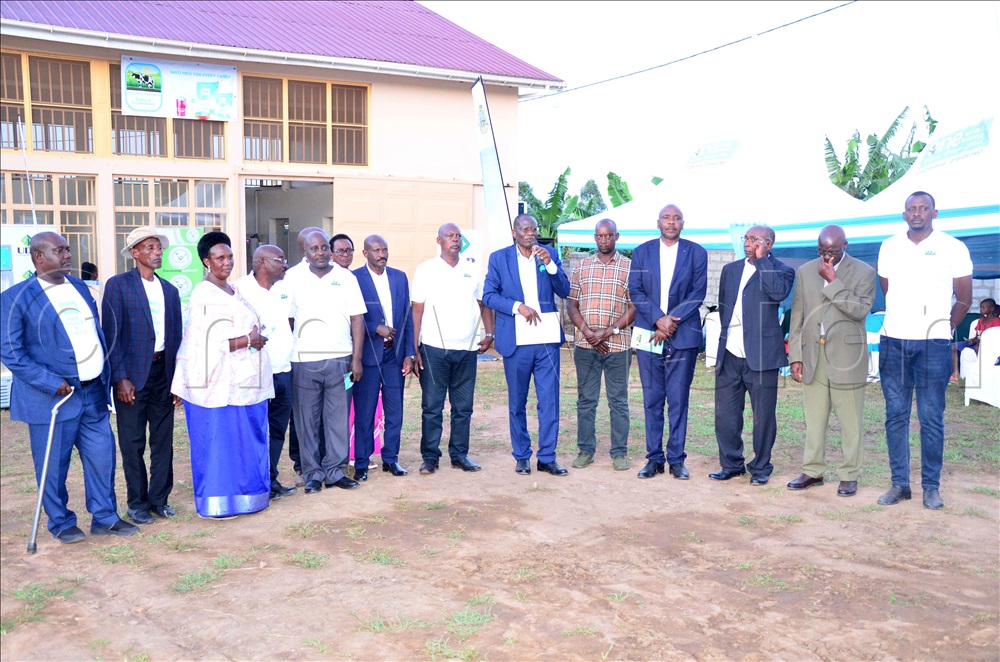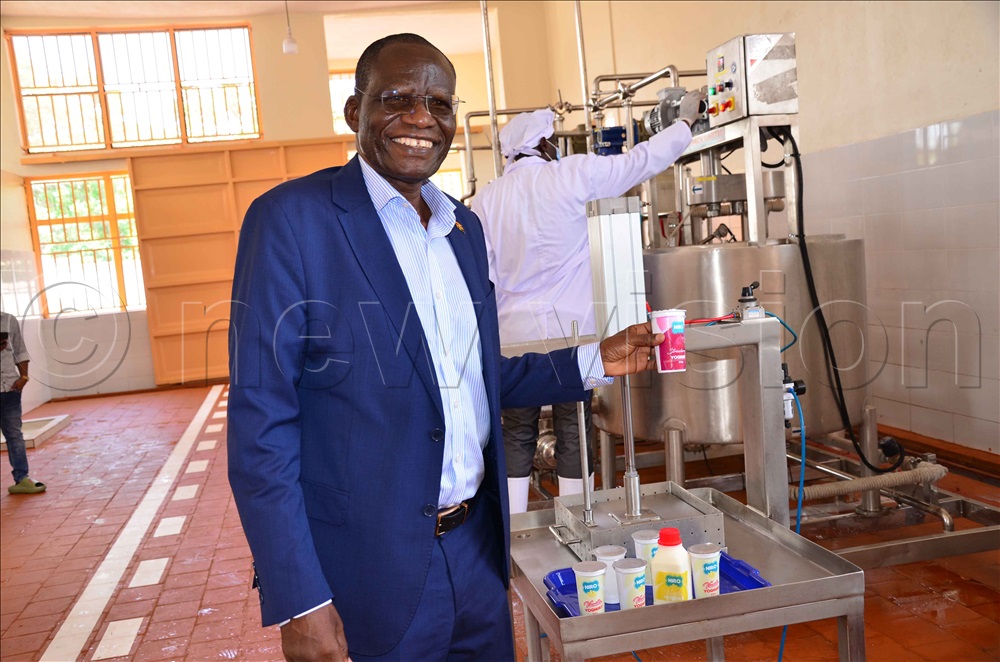By Herbert Musoke
For many years, dairy farmers under the Dwaniro Dairy Livestock Co-operative sold their milk without any value addition.
“Daily, we would collect over 35,000lts of milk to supply to large producers, mainly JESA and Rainbow dairies. However, at times our milk was rejected when they had enough, causing losses for farmers as we had to sell it at very low prices — sh600 a litre — and sometimes just pour it away,” Jessica Luzzi, the vice-chairperson of the co-operative. But now, this has changed.
Recently, the thriving co-operative received its own processing unit.
Dwaniro Farmers’ Dairy was officially commissioned on Thursday last week, as the production arm of Dwaniro Dairy Livestock and Farmers’ Co-operative in Bukomero Central, Kiboga district.
The facility was established under a co-funding arrangement between the Government, through the National Agricultural Advisory Services (NAADS), and the co-operative, aimed at adding value to the milk produced by its members.
Dr Samuel Mugasi, the NAADS executive director, says the factory was provided to empower the co-operative in value addition, creating a market for the milk while also improving household incomes.

“The factory is valued between sh700m and sh1b. NAADS believes in working with co-operatives, as they have a significant impact on many farmers. We have supported the farmer groups in the distribution of heifers and milk coolers for aggregation to now establishing a mini milk processing factory,” he says.
The factory will produce pasteurised milk, yoghurt, cheese, ghee and butter with the NIRO brand name, at a production capacity of 500 litres a day.
Cooperative’s establishment
Johnson Kwesigabo, the co-operative chairperson, says the union started in 2011 by 10 cattle farmers who were involved in traditional livestock keeping.
They would travel over 30km to JESA Farm Ltd to sell their milk. They rode bicycles and motorcycles to deliver the milk, grappling with poor roads that made it very difficult to modernise their farms, especially during the rainy season.
Currently, the co-operative has three collection centres; Dwaniro is the main centre, along with Migyina and Kiryanyonza, where milk is received and chilled.
On average, they collect 35,000litres of milk, generating a turnover of about sh13b.
“We contracted a transporter with a refrigerated truck to transport our milk to JESA Farm,” he says.
Membership
“Since then, we have grown to400 members but serve over 800 farmers. Membership is open to all dairy farmers in Kiboga district,” Kwesigabo says.
Financial services
Dickson Kabanda, the secretary for finance, says the co-operative has established a savings and credit co-operative society (SACCOS), where members can access loans for emergencies, school fees, business needs and farm development.
“The SACCOS now has a portfolio of over sh600m in savings and over sh500m in loans. Members are paid after 15 days, with the co-operative distributing over sh60m to farmers from which they save,” he says.

Additionally, through the co-operative, members have borrowed money from Uganda Development Bank. They initially borrowed sh400m, then secured another loan of sh800m, followed by a sh1.5b loan, which they plan to repay by January next year.
“The co-operative borrows money on behalf of the members because they can’t access it individually. The funds are used to improve farms by enhancing breeds, purchasing machinery, ensuring hygiene and providing training, which largely explains the transformation of dairy farming among members,” Kabanda says.
The co-operative retains sh200 per litre of milk handled to cover overhead operation costs such as transport, electricity for chilling milk and value addition. For example, if a litre sells for sh1,100, farmers are paid sh900 per litre.
Impact on members
Samuel Kamya, the co-operative secretary, says apart from providing a ready market, the co-operative has equipped members with skills and modern agronomic practices, leading to improvements in production and productivity.
Everything is provided on credit to members who supply milk to the co-operative.
Farm inputs
Members are supplied with quality inputs such as cattle drugs, acaricides, milk cans and water tanks on credit, with payment made upon milk supply.
Through a partnership with Heifer International, members received valley dams, chaff cutters and home solar systems.
Employment
The co-operative employs about 35 staff directly and creates approximately 200 indirect jobs for youth and women in as transport, motorcycle repair and catering.
At the processing factory, over 20 additional people will be employed, along with hundreds of jobs in marketing, sales, distribution and transportation.
Challenges
Chairperson Kwesigabo says low milk prices remain a significant challenge for the co-operative, with prices dropping to as low as sh600 per litre during the rainy season, while production costs remain high.
Extension services
With support from government institutions like NAADS, Heifer International, the Dairy Development Authority, JESA Farm, and local authorities, members have received training and practical skills in dairy farming, animal health, pasture production and management, vaccination against foot and mouth disease and lumpy skin, milk quality management, and value addition.
The co-operative has also provided clean and safe water to communities in Muyenje and Dwaniro through a project funded by Heifer International.





